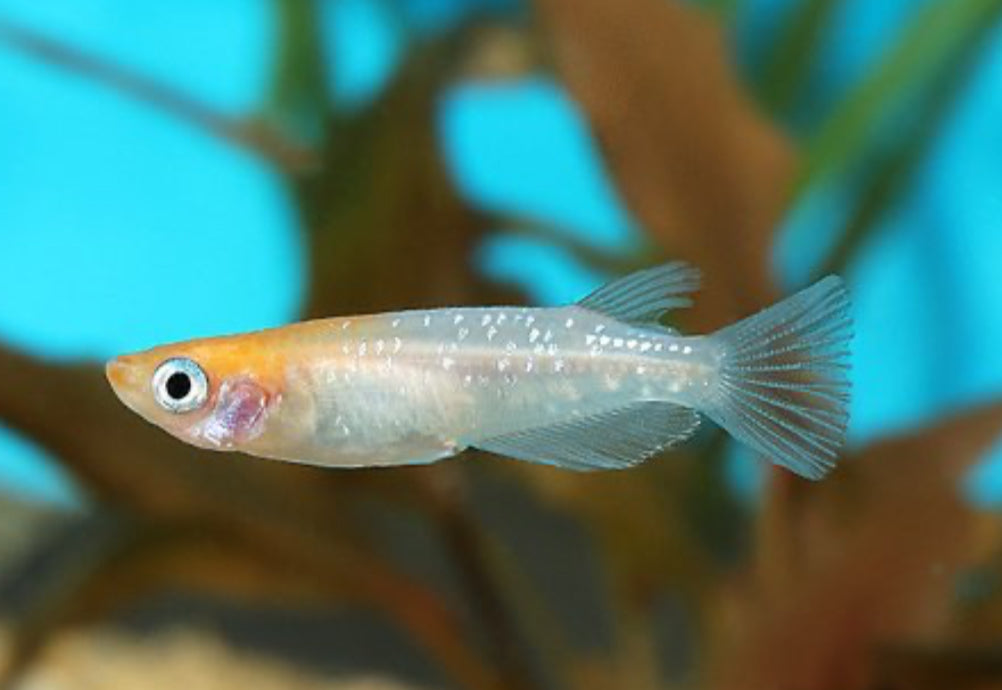THE EVOLVED FISH
"Kohaku Lamé Medaka Ricefish"
"Kohaku Lamé Medaka Ricefish"
Couldn't load pickup availability
Kohaku Lamé Medaka Ricefish (Oryzias latipes) – Species Summary
General Overview:
The Kohaku Lamé Medaka is a selectively bred strain of Oryzias latipes, known for its striking white body, red head markings (Kohaku pattern), and sparkling metallic sheen (Lamé). Originating from Japan, these ricefish are renowned for their graceful swimming, peaceful temperament, and adaptability to a wide range of conditions. Hardy and beginner-friendly, Kohaku Lamé Medaka are perfect for nano tanks, patio ponds, or aquascapes, where their coloration and shimmer can truly shine.
⸻
Scientific Classification:
• Family: Adrianichthyidae
• Genus: Oryzias
• Species: O. latipes
• Common Names: Kohaku Lamé Medaka, Japanese Ricefish, Sparkle Medaka
⸻
Natural Habitat & Distribution:
• Oryzias latipes is native to East Asia, including Japan, Korea, and eastern China
• In the wild, they inhabit slow-moving streams, rice paddies, ditches, and ponds
• This particular strain (Kohaku Lamé) is captive-bred in Japan and is not found in nature
• Adaptable to a variety of environments including indoor aquariums and outdoor tubs or mini ponds
⸻
Physical Characteristics:
• Size: 1–1.5 inches (2.5–4 cm)
• Body is pearlescent white with a bold red-orange head patch (Kohaku coloration)
• The “Lamé” trait adds a metallic shimmer, particularly noticeable under direct light
• Slender body with short fins; females often have a rounder belly when carrying eggs
• Easily visible from above, making them ideal for top-down viewing ponds or bowls
⸻
Behavior & Social Structure:
• Peaceful, schooling fish best kept in groups of 6 or more
• Active swimmers, often seen cruising mid-to-upper levels of the tank or pond
• Very social with their own species; compatible with other peaceful, small fish
• Do well in species-only setups or gentle community tanks
• Extremely curious and interactive with their environment
⸻
Water Parameters & Aquarium Care:
• Temperature: 64–78°F (18–26°C); can tolerate lower temperatures down to ~50°F (10°C)
• pH Range: 6.5–8.0
• Water Hardness: Soft to moderately hard (5–20 dGH)
• Tank Size: Minimum 10 gallons for a small group; more space preferred for active swimming
• Substrate & Decor:
• Substrate is optional but fine gravel or sand is ideal
• Decorate with plants, floating cover, and gentle flow
• Thrive in well-lit tanks where their metallic scales sparkle
• Filtration:
• Gentle to moderate flow
• Maintain stable, clean water, especially for breeding and color intensity
⸻
Diet & Feeding:
• Omnivorous and easy to feed
• Preferred diet includes:
✅ High-quality micro pellets or flake food
✅ Frozen/live foods like baby brine shrimp, daphnia, mosquito larvae
✅ Occasional treats of vegetable matter (algae-based flakes, spirulina)
• Feed 1–2 times daily, only what they can eat in a few minutes
⸻
Breeding & Reproduction:
• Egg scatterers and very easy to breed in captivity
• Females carry sticky eggs attached to their vent area before depositing them on plants or spawning mops
• No parental care; eggs hatch in 7–10 days, depending on temperature
• Fry are tiny and should be separated from adults if survival is desired
• Feed fry infusoria, powdered fry food, and eventually baby brine shrimp
⸻
Interesting Facts:
• The name “Kohaku” is inspired by Koi patterns—white base with red markings
• “Lamé” refers to the metallic glitter gene introduced through selective breeding
• Medaka have been used in scientific research and were even sent into space experiments due to their resilience
• Unlike many tropical fish, Medaka can be kept outdoors seasonally in temperate climates
⸻
Conservation & Sustainability:
• This is a captive-bred ornamental strain, not collected from the wild
• Widely bred by Japanese and international breeders
• Always purchase from reputable sources to ensure quality and healthy genetics
⸻
Final Thoughts:
Oryzias latipes “Kohaku Lamé” is a stunning, hardy, and low-maintenance ricefish, ideal for both beginners and seasoned aquarists. Whether viewed from above in a patio pond or from the side in a planted tank, their coloration and sparkling scales make them a visual highlight. With peaceful behavior, cold tolerance, and easy breeding, they’re a versatile and rewarding species that adds elegance and charm to any freshwater setup.


